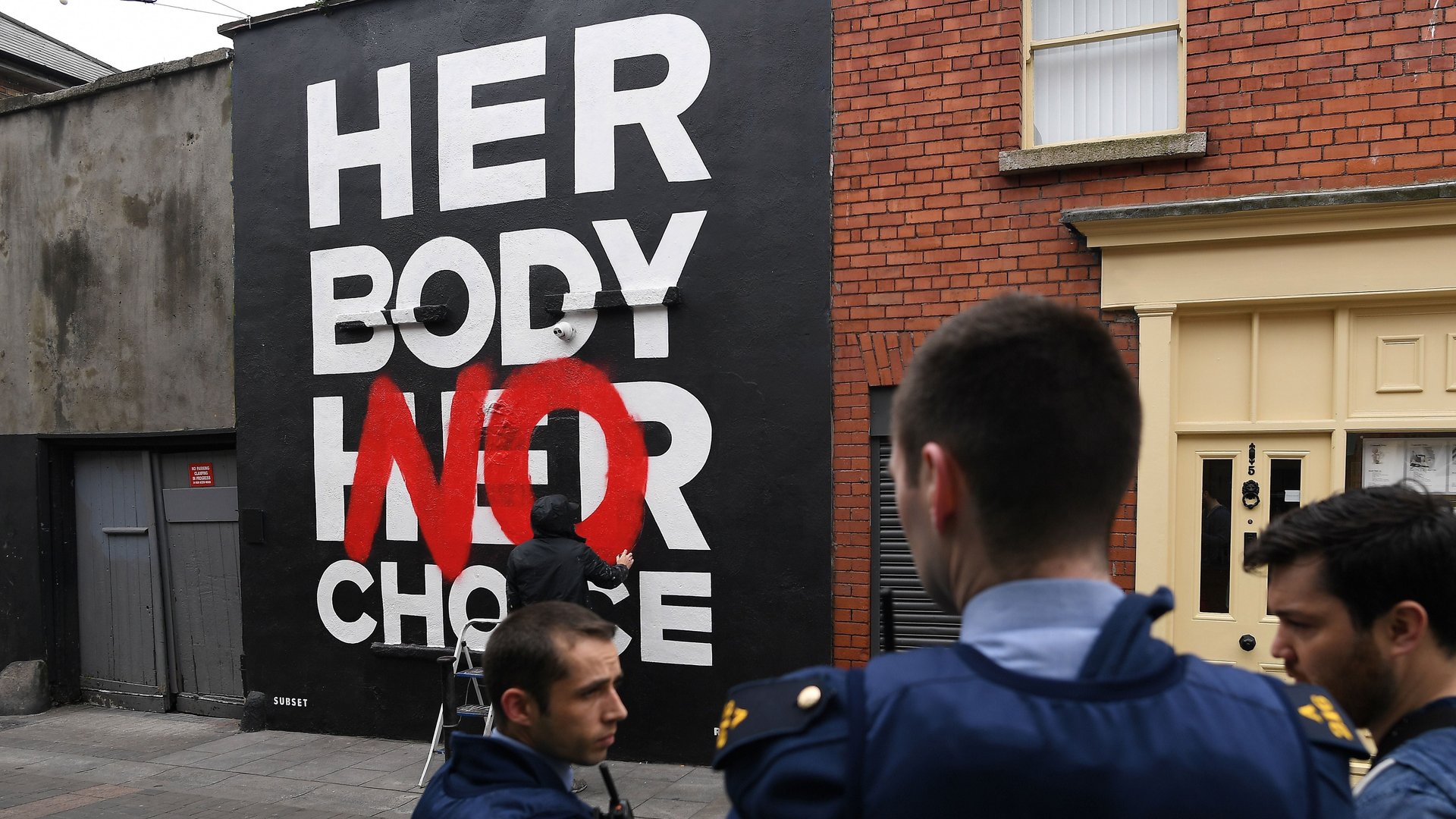Ireland’s abortion opponents are pitting disability rights against women’s rights
Ireland currently has one of the the strictest abortion regulations of any European country. On Friday, May 25, that may change.


Ireland currently has one of the the strictest abortion regulations of any European country. On Friday, May 25, that may change.
Irish citizens will vote in a referendum on whether to allow the legalization of abortion for women who are up to 12 weeks pregnant. Currently, under the Eighth Amendment of the Irish constitution, abortion is illegal in almost all cases. A 2013 law (pdf) provides an exception if the pregnancy poses a risk to the mother’s life because of a physical illness, or if she is at risk of suicide.
Recent polls show that slightly more than half (56%) of Irish voters are in favor of repealing the 8th amendment. The “Vote No” camp has tried to rally conservative voters against the referendum based on arguments ranging from the religious to the ethical. But one in particular has proved controversial: The claim that legalizing abortion will prompt the vast majority of parents in Ireland to elect to terminate fetuses diagnosed with Down syndrome.
Anti-abortion campaigners have plastered ads around the country featuring children with Down syndrome, along with the message: “In Britain, 90% of babies with Down syndrome are aborted.”
Irish prime minister Leo Varadkar protests this tactic, telling Irish media, “I think it’s wrong [to use the photos] because we have made it very clear in the proposed legislation that disability will not be grounds to end a pregnancy.” He accused the “No” campaign of attempting to “muddy the waters and create confusion.”
Indeed, according to Ireland’s National Campaign to Remove the Eighth Amendment, “abortion in cases of disability will not be permitted” if the amendment is repealed and a new law is passed. In essence, if a woman were to take a prenatal screening test at 10 weeks and find out that the fetus had Down syndrome, she could elect to have an abortion without specifying the reason. But after 12 weeks, abortion on the grounds of disability would not be permitted, unless the disability endangers the mother’s life.
The “No” camp, however, argues that if the government legalizes abortion for any reason up to the 12-week mark, mothers will be more likely to choose to abort fetuses with Down syndrome. How justified is that concern? It’s complicated.
Down syndrome and abortions
It is true that, in countries where reliable data is available, a large majority of prenatal Down syndrome diagnoses end in the termination of pregnancies. For example, in the case of England and Wales in 2013, of the 1,232 pre-birth diagnosis of fetuses with Down syndrome that year, 75% were aborted; 1.6% suffered fetal death; the outcome was unknown for 16.6%; and 6.7% ended in live births, according to the National Down Syndrome Cytogenetic Register for England and Wales.
Ireland’s abortion opponents point to the case of Iceland, where abortion is legal for most reasons up to 16 weeks. In Iceland, close to 100% of fetuses diagnosed with Down syndrome in a prenatal screening test are aborted. By comparison, the US has an estimated termination rate for Down syndrome of 70-85%; in France, it’s 77%; and in Denmark, 98%.
The numbers are more complicated than they seem. The population of Iceland is just 330,000 people, with between 4,000 and 5,000 births per year. Iceland’s average of one or two babies with Down syndrome born each year isn’t easily comparable to the average in a larger country.
The popularity of prenatal screening in Iceland is also a factor in determining abortion outcomes. In Iceland, between 80-85% of women receive prenatal screening. In the UK, by contrast, where it is legal to abort fetuses because of disability, about a third of pregnant women opt out of screening.
Prenatal screening is not a regular choice for Irish women either, Jennifer Donnelly, a obstetrician and gynecologist consultant and expert in maternal fetal medicine at Rotunda Hospital in Ireland, tells Quartz. “Disability is something that is used as a scaremongering tactic because it’s a departure from the current legislation,” she said. But, Donnelly clarifies, “the likelihood of somebody getting [prenatal non-invasive screening] as a matter of routine as a result of the legislation is very unlikely.”
In fact, some studies conducted in Scotland and in the US have found that, despite an increase in prenatal screenings for disabilities like Down syndrome, abortion rates for babies with Down syndrome have stayed the same or decreased over time. So if Irish women are given the right to selectively abort up to 12 weeks, it’s unclear how that would affect the birth rates of children with Down or other disabilities.
Chris Kaposy, an Irish bioethicist and the father of a son with Down syndrome, has weighed in on this debate from a personal perspective. In an interview with The Guardian, he has called the “No” campaign’s use of Down syndrome imagery “propagandistic.” He says that pro-choice and disability-positive agendas are far from mutually exclusive.
“People with Down’s syndrome tend to lead flourishing lives,” he told The Guardian. “Their families typically thrive. Perhaps more parents would choose children with this condition if they knew these facts. Prospective parents should be empowered to make choices in favor of parenting children with disabilities like Down’s syndrome, rather than being prohibited from choosing against disabilities.”